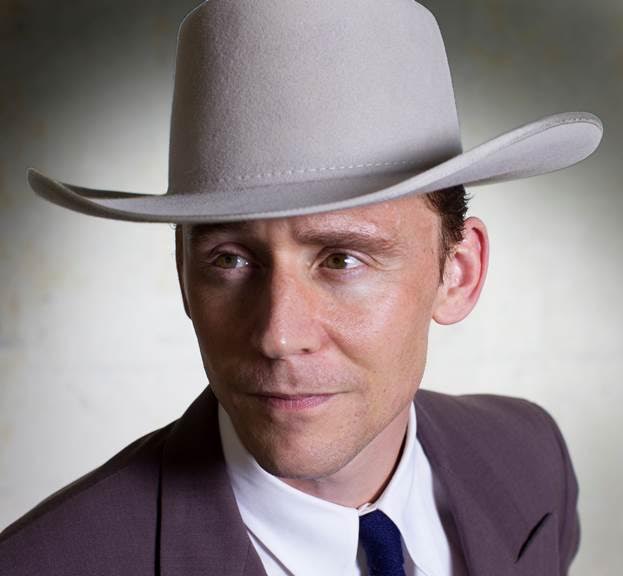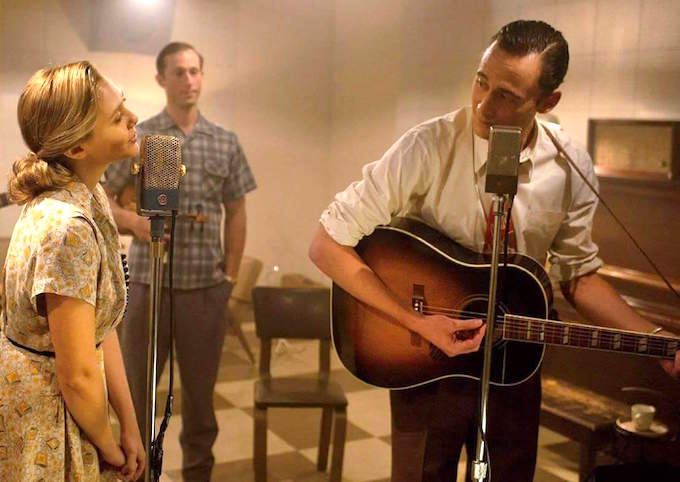 Hank Williams' legend came from his songwriting with dozens of hits in a short career. Ironically the star-making song was "Lovesick Blues," a tune he did not write that he promised his producer he would make his own in a crucial recording session. He assures that the audience will love it, praising its simplicity. A studio musician snidely compares it to his original compositions which reminds the star that "simple" is not a compliment to everyone. Williams deflates a little, ego punctured, until he steps up to the microphone and gets the job done as promised. There are multiple metaphors in their somewhere about the biopic genre. We shan't try to unpack them all but let's just say that they're not too flattering to the genre as a whole.
Hank Williams' legend came from his songwriting with dozens of hits in a short career. Ironically the star-making song was "Lovesick Blues," a tune he did not write that he promised his producer he would make his own in a crucial recording session. He assures that the audience will love it, praising its simplicity. A studio musician snidely compares it to his original compositions which reminds the star that "simple" is not a compliment to everyone. Williams deflates a little, ego punctured, until he steps up to the microphone and gets the job done as promised. There are multiple metaphors in their somewhere about the biopic genre. We shan't try to unpack them all but let's just say that they're not too flattering to the genre as a whole.
I Saw the Light, directed by Marc Abraham a successful producer, has the shape of an extremely traditional bio, charting key moments in Williams (Tom Hiddleston) rise to greatness and subsequent personal and professional failures fueled by his addictions until his premature death at 29. The moments even come with hepful titles of years / places. You've heard this story a million times now -- only the names / dates / music genre change -- which is perhaps why the movie starts so abruptly in media res...

We meet Hank Williams (Tom Hiddleston) as he's marrying Audrey (Elizabeth Olsen) and taking her home to mother (Broadway legend Cherry Jones). It turns out he's already an established singer with a radio show and that the two most important women in his life, already know and hate each other, both of them thinking the other a golddigger. The only dissonant fascinating note in this early squabble is that Hiddleston suggests that Hank thinks they're both right but still clings to them. In this key character nugget lies a potentially interesting movie.
But alas... what lies ahead? Nooo. It's the dread checklists of Key Moments and Greatest Hits that topple so many music biopics; they're just no subsitute for story structure and character arcs.
Hiddleston quite impressively provides his own vocals. The actor's disarming eyes are ideal windows to the soul of a man haunted by his own demons, too, especially in an interview scene when he's confronted with a vague question about said demons. Yet he never sells "hillbilly" or Treasured Son of Alabama and as undeniably attractive as the British actor is at 34 he cannot reasonably sell early twenties, especially with scenes that discuss his age wherein he's paired with actual baby-faced twentysomething actors.
Elizabeth Olsen also provides her own vocals but they're meant to be mediocre -- a sore spot between the couple. The young actress, so riveting in Martha Marcy May Marlene (2011), has yet to find a worthy follow up to that breakout performance. I Saw the Light, and to be honest Olsen herself, tend to frame her as a nagging selfish harpy, rather than the possibly tragic figure of the abandoned wife whose career dreams are crushed. As a result when they divorce, you don't miss her half as much as Hank does. Among Hanks other girls, Wrenn Schmidt manages the most sympathetic and intriguing hint of the emotional life of a famous musicians side number in a small supporting role.
Hiddleston and Olsen do manage a spontaneous lovely rapport in two very well acted bedroom scenes, the most tender of which is beautifully photographed by Oscar nominee Dante Spinotti (LA Confidential, The Insider), but the film, like their marriage is doomed. It absolutely refuses to come to life making the not unreasonable running time (123 minutes) feel much longer. The inertia arrives very early and settles in for good, as persistently numbing as alcohol, leaving the film as empty as all the bottles in Hank's hands.
(End positive. End positive)
But "I Saw The Light," which ends the film, sure is a gorgeous song.

Grade: D
Oscar Chances: Oscar voters have been known to be drawn to music biopics but this one won't be enough to entrance them, lacking the double-starred fiery charisma of "Walk the Line" or the pop glamour of "Ray"